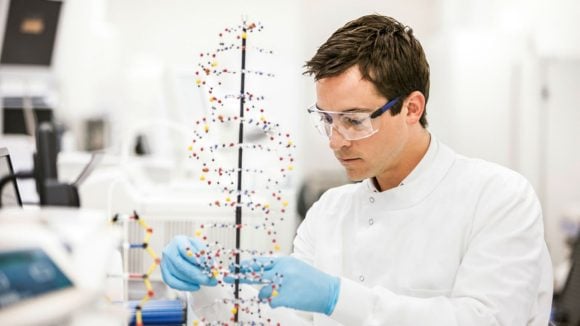The quest for eternal life: right or wrong?
August 2017 | 6 min read
In partnership with The Future Laboratory
In partnership with The Future Laboratory
We’d like to meet you
Silicon Valley is on a quest to transform us into super-humans. To optimise our performance and abilities, its scientists and technologists are working tirelessly to elevate us above the laws of nature. By using prosthetics, cybernetics, synthetics and robotics, they aim to make us smarter, stronger and practically immortal.
Lifespans are increasing. In the UK, life expectancy has risen from 76 in 1991 to 81 in 2017, and in China, the average rose from 68 to 76 in the same period, according to World Life Expectancy figures from Geoba.se. Although this is an impressive rate of biological inflation, it is simply not enough for humanity’s smartest minds.
When asked in an interview with The New York Times about why everyone in Silicon Valley is so obsessed with immortality, PayPal founder Peter Thiel replied: 'Why is everyone else so indifferent about their mortality?'
Thiel and his peers are refusing to accept the ancient truth that we are all mortals who must one day die. They are seeking nothing less than a cure for death, investigating everything from smart drugs and blood enhancements to lab-grown organs and robotic body parts. Technology that will upload our memories to the Cloud to allow us to live for ever in online virtual worlds is very much on their agenda.
Interwoven with this quest for immortality is the growing understanding that eternal life is pointless without ensuring we remain at our mental and physical peak. To do so, the techno-pioneers argue, we will need to use a new wave of scientific innovation to optimise our bodies and minds. They envisage a future in which those of us who have the funds to afford it will be progressively upgraded to live not only longer, but more creatively, joyously and productively than our inferior ancestors.
Just this year, serial entrepreneur Elon Musk announced the founding of a new company, Neuralink, with a mission to create neural brain implants that will enable humans to connect their minds directly with online machines 'telepathically'. This would enable us to process data so quickly and efficiently that we would be able to tackle tasks that might take days today in the blink of an eye tomorrow.
The dream of immortality, combined with god-like mental and physical abilities, has permeated storytelling and philosophy throughout human existence. But as it becomes closer to reality, it is time to consider the ethics of our quest for eternal optimization.
In collaboration with two innovative film-makers, The Future Laboratory asks: Even if we could live optimized lives forever - should we? And would the price we pay be our humanity?
Are you happy about an optimized tomorrow?
Today human optimization is moving rapidly from science fiction to science fact.
Looking 30 years ahead, six people explore their hopes and fears about a future of mainstream body and mind modification - when even immortal life could be up for sale
Film by Present Plus Film in collaboration with The Future Laboratory for UNLIMITED
RIP Homo Sapiens?
Consider a child born in the next decade, growing from optimized embryo to 150-year-old adult, his ageing limbs, organs, and even brain, being upgraded with cybernetic replacements that could last forever.
Now consider a question: Is he still human?
Film by Samuel Murdoch in collaboration with The Future Laboratory for UNLIMITED
Conclusion
As the speed of technological progress increases, the prospect of ever-lasting life is beginning to feel, temptingly, tantalizingly, within our grasp, perhaps even within our lifetimes.
It's a hugely exciting and inspiring possibility. But alongside the promise of long, fulfilling extra years in which to work, love, and play, there will almost certainly be darker side-effects to be experienced. It is time to consider how much life is enough, explored in-depth by our UNLIMITED partners Vice.
So, as you ponder whether you would accept the offer of tech-empowered immortality, imagine waking one morning in the 22nd century, ready to celebrate your 150th birthday. Your optimized body looks and feels 30, your enhanced mind is plugged directly into that repository of all human knowledge and wonder, the World Wide Web, you’ve experienced real life space travel and adventures in hundreds of astonishing virtual worlds too.
But your birthday party may have some heart-breaking gaps at the dinner table – all those much-loved friends, colleagues and family who couldn’t afford to upgrade. And who are now just fading memories.
If that feels like too high a price to pay to live forever, then humanity faces a series of thorny ethical dilemmas in the decades ahead. As a species, we will have to ask ourselves how we can ensure that the coming advances in genetics and cybernetics are made available to everyone, not just those with the financial wherewithal to pay for them. Otherwise, those lucky Optimized few may find their 150th birthday more bitter than sweet and, facing more centuries of lost friends and lovers ahead, find themselves asking: ‘Do I still want to live forever?’
Other articles you might like
Other articles you might like
Whatever your goals, UBS can help you get the best for your life, family and business.
Whatever your goals, UBS can help you get the best for your life, family and business.
Come and see us so we can find out more about what matters to you.
We’d like to meet you
We’d like to meet you
Come and see us so we can tell you more about us.


